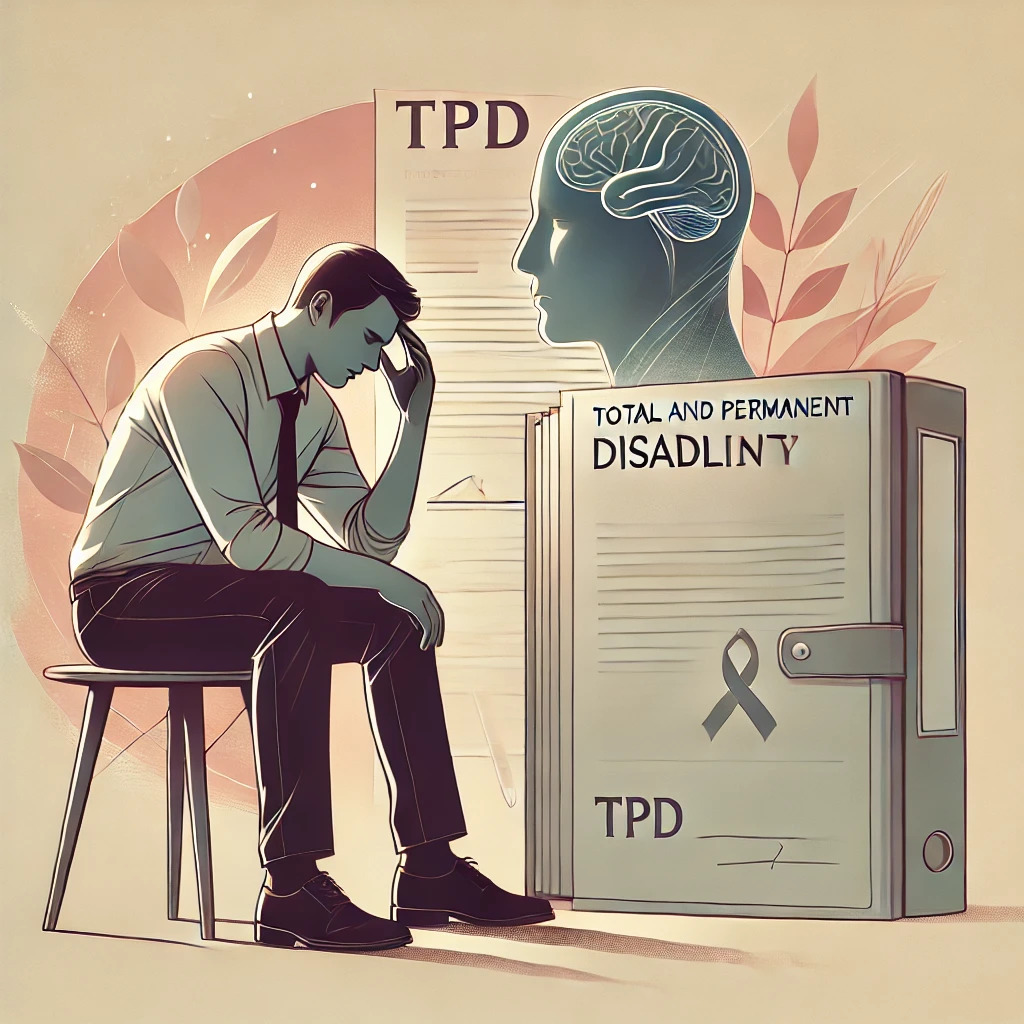Getting TPD Insurance With a Pre-Existing Condition: Is It Possible?
Navigating insurance can be tricky when it comes to Total and Permanent Disability (TPD) insurance and pre-existing conditions. If you have a condition that could hinder your ability to work, you may wonder whether getting TPD insurance is an option. It can be complicated, but it’s not entirely impossible. This article covers the challenges, options, […]
What to Do After Your TPD Claim Has Been Approved?
The approval of your Total and Permanent Disability (TPD) claim represents a significant milestone in your journey, marking an end to a challenging period of uncertainty. The relief that comes with knowing you can access funds to support your needs and lifestyle is immense. Once this approval is granted, it is essential to proceed thoughtfully […]
Your Complete Guide to Making a TPD Claim for a Back Injury
Back injuries are the most common reasons Australians find themselves unable to continue working. Whether caused by a workplace accident, a car crash, or years of physical strain, a serious back injury can affect every aspect of your life, from your ability to earn a living to your everyday mobility and well-being. If your injury […]
Returning to Work After a TPD Claim: Your Essential Guide
Making a Total and Permanent Disability (TPD) claim is never easy. It comes at a time when your health, finances, and future are already uncertain. For many Australians, a successful TPD claim brings vital financial relief, allowing them to focus on recovery without the stress of lost income. But what happens if your health improves […]
What Delays a TPD Claim? Understanding Insurer Response Times and Your Rights
When facing a debilitating illness or injury, a Total and Permanent Disability (TPD) claim can be a vital financial lifeline. Navigating the TPD claims process in Australia can be stressful when unexpected delays occur. At JI Solicitors & Associates, we understand how crucial timely outcomes are. This article discusses the common causes of TPD claim […]
How Your Initial Superannuation Choices Can Affect Your TPD Claim Years Later
When setting up your superannuation fund, it’s easy to overlook the fine print when you’re young, healthy, and focused on retirement savings rather than insurance protection. But the choices you make at that early stage can impact your ability to successfully claim a Total and Permanent Disability (TPD) benefit years, even decades, later. At JI […]
How Policy Timing and Employment Gaps Affect TPD Eligibility
Total and Permanent Disability (TPD) insurance is meant to be a financial safety net when you can no longer work due to a serious injury or illness. Many Australians assume that holding a superannuation account means automatic coverage. In reality, TPD eligibility depends on a range of factors, and policy timing and employment gaps can […]
Can You Make Multiple TPD Claims? Untangling the Myths and Realities
Suffering a total and permanent disability is life-changing; physically, emotionally, and financially. In Australia, TPD (Total and Permanent Disability) insurance provides a vital safety net, offering a lump sum payment to those unable to return to work due to severe illness or injury. A common and confusing question arises for many Australians: Can you make […]
Understanding The Difference Between ‘Own Occupation’ And ‘Any Occupation’ TPD Insurance Policies
Total and Permanent Disability (TPD) insurance is one of the most important forms of life insurance coverage in Australia. However, many Australians remain unsure about what their policy truly includes, especially when choosing between own occupation TPD and any occupation TPD definitions. This distinction can have a major impact on whether or not you qualify […]
TPD Claims for Self-Employed Australians: Unique Challenges and Solutions
Navigating a Total and Permanent Disability (TPD) insurance claim is never easy. For self-employed Australians, however, the path to a successful claim is often paved with even more complexities. With unique business structures, inconsistent income, and often limited access to employer-sponsored superannuation, self-employed individuals face challenges not typically encountered by salaried workers.
Who Qualifies for a TPD Claim? Understanding Eligibility Criteria in Australia
If you’ve suffered a life-changing injury or illness that has left you unable to work, you may be wondering if you’re eligible to make a TPD claim in Australia. A Total and Permanent Disability (TPD) claim can offer critical financial support during what is often a physically, emotionally, and financially challenging time. But who […]
How to Gather Medical Evidence for Your TPD Claim: Tips from Sydney Lawyers
If you’re facing a life-changing injury or illness that prevents you from ever returning to work, making a Total and Permanent Disability claim through your superannuation may be your lifeline. But here’s the catch: your claim is only as strong as the medical evidence you provide. Understanding how to gather the right documents can be […]
Common Mistakes in TPD Claims: Lessons Learned and Best Practices
When you find yourself unable to work due to a permanent injury or illness, a Total and Permanent Disability (TPD) claim can provide the financial support you need to manage your situation. Navigating the TPD claim process can be challenging when you’re unfamiliar with the common mistakes people make and the best practices for a […]
Superannuation and Divorce: How TPD Claims and Super Funds Are Affected
Divorce is an emotionally and financially complex experience involving many critical decisions about assets, property, and financial arrangements. The most important and sometimes overlooked aspect is understanding and protecting superannuation during separation. Superannuation, or retirement savings, is a significant marital asset in Australia. It is governed by specific laws during divorce, and there are […]
Rejected TPD Claim? A Step-by-Step Plan After Your TPD Claim Is Denied
Total and Permanent Disability (TPD) insurance provides financial support if you’re unable to work due to a severe injury or illness. However, the process of claiming TPD benefits can be challenging, and many applicants face rejection. Receiving a TPD claim rejection can be emotionally distressing, adding financial pressure to an already difficult situation. If […]
Choosing the Right TPD Insurance: How Much Coverage Do You Really Need?
Total and Permanent Disability (TPD) insurance is a crucial financial safety net for individuals who are permanently unable to work due to a disease or disability. It provides financial support, ensuring they can lead independent lives. Choosing the right TPD insurance coverage amount is essential for securing financial stability in the event of unforeseen circumstances. […]
Can You Claim TPD for Mental Illness? Key Considerations for Your Claim
As mental health awareness grows, more individuals are seeking to understand their rights regarding Total and Permanent Disability (TPD) insurance. If you are living with a mental health condition such as depression, anxiety, PTSD, or bipolar disorder, you might be wondering if you can make a TPD claim for mental illness. Understanding the ins and […]
5 Common Types of TPD Claims in Sydney and How JI Solicitors Can Assist You
Most superannuation funds have a Total and Permanent Disability (TPD) claim policy. When an individual is no longer able to work due to severe injury or illness, they can file for a Total and Permanent Disability claim. Claimants receive a lump sum amount of payment, providing significant financial support during times of crisis. Having […]
The Impact of Psychological Injuries on TPD Claims: Understanding Your Rights
Total and Permanent Disability (TPD) claims provide financial relief to individuals who are unable to work due to severe injuries or illnesses. While TPD claims are commonly associated with physical injuries, psychological injuries can also be grounds for a claim. Mental health conditions, such as depression, anxiety, post-traumatic stress disorder (PTSD), and bipolar disorder, can […]
What Are the Most Common TPD Claims in Australia? Essential Tips for Success
Total and Permanent Disability (TPD) claims provide financial support to individuals unable to work due to severe disabilities. In Australia, filing TPD claims can be complex, and understanding the most common claims can impact your chances of success. In this blog, we highlight the most common TPD claims, key factors that affect these claims, […]
What is TPD Insurance? A Comprehensive Guide for Australians
Total and Permanent Disability (TPD) insurance is a critical form of financial protection designed to support individuals who are unable to work due to a severe disability or illness. For Australians, this type of insurance offers peace of mind and financial security during some of life’s most challenging moments. This guide will provide a comprehensive […]
TPD Insurance vs Income Protection: What’s the Difference?
When considering financial protection for illness or injury, individuals are often given a choice between two common insurance options: TPD Insurance vs Income Protection. While both offer crucial support during difficult times, they serve different purposes and work in distinct ways. In this blog, we have highlighted the key differences between both options to help […]
Superannuation TPD Claim Guide: How to Succeed in Australia
Financial stability becomes a pressing concern when life throws an unexpected curveball, such as a debilitating injury or illness. In such circumstances, superannuation TPD claim can provide a crucial safety net for individuals unable to work due to a total and permanent disability. A thorough understanding of the TPD claims process in Australia is essential to […]
TPD Payout From a Superannuation Fund: Understanding TPD Claims
Total and Permanent Disability (TPD) insurance plays a crucial role in providing financial support for those who can no longer work due to a permanent disability. Many Australians are unaware that their superannuation funds often include TPD insurance coverage, offering a valuable financial lifeline during difficult times. This blog explores the TPD payout process from […]
What Is A Franchise Agreement And What Should It Contain?
Understanding the ins and outs of a franchise agreement is essential to ensure a successful partnership. This document outlines the terms and conditions governing the relationship between a franchisor and a franchisee. From royalties and fees to operational standards and dispute resolution, a well-crafted agreement contract provides a roadmap for both parties. In this blog, […]
How Are Assets Divided in a Divorce in Australia?
Divorce proceedings are a challenging and complex process, especially when it comes to the division of assets. Understanding how are assets divided in a divorce in Australia is crucial for anyone going through this process. It helps ensure a fair division and aids in planning for a stable financial future post-divorce. This blog offers a […]
Understanding Child Custody Laws and Rights in Australia
Child custody is a critical aspect of family law that deals with the care, control, and maintenance of children when parents separate or divorce. In Australia, the primary concern of the legal system is the best interests of the child, ensuring their well-being and stability. This guide provides an in-depth understanding of child custody laws […]
Legal Steps in the Divorce Process in Australia: A Comprehensive Overview
Going through a divorce can be emotionally challenging and exhausting. The various legal procedures involved make this process even more complicated. Understanding these legal requirements can help ease the challenges that come with it. This comprehensive overview aims to guide you through the legal steps involved in the divorce process in Australia. Steps in the Divorce […]
What is a ‘De Facto’ or Domestic Relationship? A Comprehensive Guide
Modern society is witnessing a shift in how individuals choose to structure their personal lives. An increasing number of couples are opting for de facto or domestic partnerships, where they cohabitate, share finances, and may even raise children together, but without formally marrying. Understanding the legal implications of a de facto relationship is crucial for […]
The Impact Of Pre-Existing Conditions On TPD Claims: What Applicants Need To Know
Filing a Total Permanent Disability (TPD) claim is often a stressful process, especially if you have a history of medical conditions. Whether you’re covered through your superannuation or have a retail policy, your health background can significantly impact the success of your claim. Insurers take a detailed look at your past medical history, and if […]
Navigating TPD Claims for Rare or Invisible Illnesses: Overcoming the Evidence Gap
When it comes to Total and Permanent Disability (TPD) claims, Australians living with rare or invisible illnesses often face significant hurdles. Unlike visible injuries or commonly understood conditions, rare diseases and chronic, non-apparent illnesses (such as fibromyalgia, ME/CFS, lupus, or complex PTSD) often lack universally accepted diagnostic criteria. This creates a gap in evidence that can be incredibly challenging to bridge.































